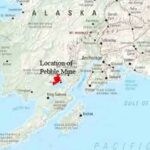
HOMER—On June 30, the proposed Pebble Mine’s supply camp at headwaters of Bristol Bay burned to the ground in a wildfire, leaving a charred mess of melted metal on state land. Meanwhile, July 11, Bristol Bay’s fishing fleet broke its harvest record, reaching 46,564,310 sockeye salmon harvested. The total Bristol Bay sockeye salmon run record is expected to be broken this week, but as of July 11, it was 61,043,165. The contrast between the charred mess of the proposed Pebble Mine’s helicoptered-in materials and the sustainable, record-breaking, world treasure of the Bristol Bay sockeye salmon run could not be more clear.
“This mess is a prime example of how unable the Pebble Partnership is to predict, prevent and respond to climate change-driven events like wildfires and extreme weather — and showcases the risks of locating a giant open pit and waste site at the headwaters of the greatest sockeye salmon fishery in the world,” said Tim Bristol, executive director of SalmonState. “What’s equally disturbing is that the state is clearly trying to keep this news quiet, and that organizations like ours are the ones ensuring the world knows about it two weeks after the event. We urge the EPA to finalize the protections it has proposed for this region by the end of 2022. Twenty years of fighting this ill-conceived idea is enough.”
The EPA has proposed protections for Bristol Bay, finding that the proposed Pebble Mine “would cause permanent damage to an ecosystem that supports a renewable economic powerhouse and has sustained fishing cultures since time immemorial,” as Regional Administrator for EPA Region 10 Casey Sixkiller stated in the above-linked news release.
The agency recently extended the comment period for these proposed protections until September 6, 2022.
The wildfire that destroyed Pebble’s supply camp is the Upper Talarik fire, part of the Lime Complex fire.
